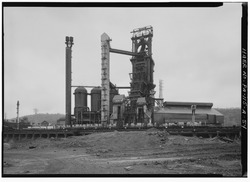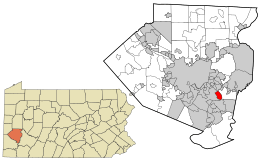Duquesne, Pennsylvania facts for kids
Quick facts for kids
Duquesne, Pennsylvania
|
|
|---|---|

Former "Dorothy Six" blast furnace
|
|

Location in Allegheny County and the U.S. state of Pennsylvania.
|
|
| Country | United States |
| State | Pennsylvania |
| County | Allegheny |
| Settled | 1885 |
| Incorporated | September 12, 1891 (borough) |
| January 7, 1918 (city) | |
| Area | |
| • Total | 2.01 sq mi (5.21 km2) |
| • Land | 1.82 sq mi (4.70 km2) |
| • Water | 0.20 sq mi (0.51 km2) |
| Population
(2020)
|
|
| • Total | 5,254 |
| • Density | 2,893.17/sq mi (1,116.98/km2) |
| Time zone | UTC-5 (EST) |
| • Summer (DST) | UTC-4 (EDT) |
| ZIP code |
15110
|
| Area code(s) | 412 |
| FIPS code | 42-20432 |
Duquesne (pronounced dew-KAYN) is a city located along the Monongahela River in Allegheny County, Pennsylvania, United States. It's part of the larger Pittsburgh metropolitan area. In 2020, about 5,254 people lived there.
Contents
History of Duquesne
The area where Duquesne now stands was first settled in 1789. It officially became a city in 1891. The city got its name from Fort Duquesne, an important historical fort.
Steel Industry and "Dorothy Six"
For many years, the Duquesne Works was a very important steel mill in the city. It was first part of the Carnegie Steel Company and later U.S. Steel. This steel mill was the heart of Duquesne, especially in the early 1900s.
Duquesne was home to the world's largest blast furnace, which was a huge oven used to make iron from raw materials. This famous furnace was nicknamed "Dorothy Six." The musician Bob Dylan even wrote a song called Duquesne Whistle about it!
Changes Over Time
Duquesne's population was highest in 1930. After that, the number of people living in the city started to go down. This happened because of big economic changes, like the Great Depression and the decline of the steel industry after World War II.
Today, Duquesne looks very different from its busy industrial past. In 1948, there were more people working in the city's steel mill than the total number of people living in Duquesne in 2010. In 1991, the state of Pennsylvania recognized Duquesne as a city facing financial challenges.
Geography of Duquesne
Duquesne is located right next to the Monongahela River. It's about 12 miles (19 km) south of the big city of Pittsburgh.
The city covers a total area of about 2.0 square miles (5.2 square kilometers). Most of this area, about 1.8 square miles (4.7 square kilometers), is land. The rest, about 0.2 square miles (0.5 square kilometers), is water.
Population Changes
| Historical population | |||
|---|---|---|---|
| Census | Pop. | %± | |
| 1860 | 870 | — | |
| 1870 | 1,720 | 97.7% | |
| 1900 | 9,036 | — | |
| 1910 | 15,727 | 74.0% | |
| 1920 | 19,011 | 20.9% | |
| 1930 | 21,396 | 12.5% | |
| 1940 | 20,693 | −3.3% | |
| 1950 | 17,620 | −14.9% | |
| 1960 | 15,019 | −14.8% | |
| 1970 | 11,410 | −24.0% | |
| 1980 | 10,094 | −11.5% | |
| 1990 | 8,525 | −15.5% | |
| 2000 | 7,332 | −14.0% | |
| 2010 | 5,565 | −24.1% | |
| 2020 | 5,254 | −5.6% | |
| Source: | |||
In 2000, there were 7,332 people living in Duquesne. The average household had about 2.28 people. Many households, about 28.1%, had children under 18 living with them.
The population's age groups were spread out. About 28.3% of the people were under 18 years old. The median age in the city was 36 years old.
Education in Duquesne
The Duquesne City School District runs a public elementary school for younger students.
The Duquesne High School closed in 2007. Since then, students from Duquesne who are in high school go to either West Mifflin Area High School or East Allegheny High School.
Since July 2007, a group called the Allegheny Intermediate Unit (AIU) has been in charge of managing the Duquesne school district for grades K-8. As of 2023, the school district now includes grades 6-8 as well.
Notable People from Duquesne
Many interesting people have come from Duquesne, including:
- Daniel Ford, a musician
- Gene Gedman, a running back who played for the Detroit Lions football team
- Martha Farkas Glaser, a civil rights activist and manager for jazz musician Erroll Garner
- Earl Hines, a famous jazz pianist
- Ed Karpowich, an NFL player
- George Little, an NFL player
- Dave Maurer, a college football coach who is in the College Football Hall of Fame
- Frederick J. Osterling, an architect
- Dave Pilipovich, a basketball head coach
- Lafayette Pitts, a cornerback for the Atlanta Falcons football team
- Alex Shigo, a horticulturist (someone who studies plants and gardening)
- Johnny Stevens, an MLB umpire
- Donald Soffer, a businessman and investor
See also
 In Spanish: Duquesne (Pensilvania) para niños
In Spanish: Duquesne (Pensilvania) para niños

